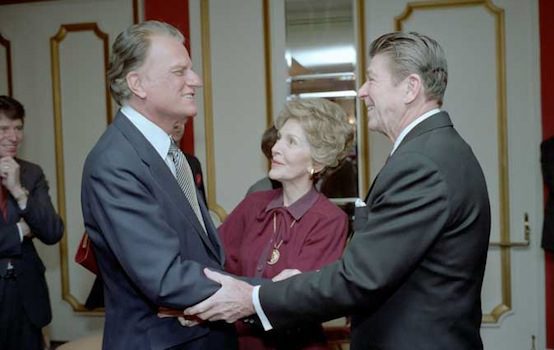Billy Graham: American Pastor With A Global Flock

World-famous evangelist Billy Graham died early Wednesday at the age of 99 in his mountain home in Montreat, North Carolina. But unlike most headlines today dealing with religion and conservatism and figures famous for both, the news of his death did not draw the usual hyper-partisan carping from the media or the chattering class. In fact today, he’s being called “America’s Pastor.”
In the 1950s I heard an interview with Graham on TV in which the inspirational pastor expressed his readiness to die in order to be united with his maker in Heaven. Fortunately for Graham’s devoted wife Ruth, his son and successor Franklin, and the millions whom his ministry touched, this wish would not be granted for more than 60 years after I heard it expressed. By then, Graham had completed over 400 preaching events across the world, finishing his last crusade in New York City in 2005. Some 1,400 regional churches participated in this finale, while the sponsors came from 82 Christian denominations.
One could hardly describe Graham as a broad-minded figure in what and how he preached. His message was both simple and stark: there is but one path to salvation and that is in the acceptance of Jesus Christ as one’s Lord and Savior. This was by no means a curious view—even the possible religious skeptic Thomas Hobbes in his political classic Leviathan describes the Christian as one who accepts Christ as his Savior. Graham’s simple message took him on a redemptive mission across the globe, to every continent, to “save” as much of the human race as possible.
Given his biblical social morality, it is remarkable Graham never became a villain of the cultural Left. Reports of his death in the national press have been uniformly respectful. In addition to praises from the usual social conservative quarters, former President Barack Obama weighed in on Twitter, saying Graham “was a humble servant who prayed for so many—and who, with wisdom and grace, gave hope and guidance to generations of Americans.” The Rev. Jesse Jackson added his respects, saying the late evangelist “helped a lot of people against a backdrop of Southern culture. He’s on the plus side of history. May his soul Rest In Peace.”
The dignified and even friendly treatment that the media and pundits on both sides are affording Graham could be explained in a number of ways. One, he was quite old and had been out of public view for more than a decade. Two, unlike other popular evangelists, he never let down his flock with unseemly scandal. Three, although his son Franklin was and still is a strong backer of Donald Trump and the Republican Party, the elder Graham generally kept out of politics. Earlier in Graham’s ministerial life he had been an adviser and chaplain to several presidents, including Richard Nixon, but aside from endorsing Nixon, he wasn’t known for mixing religion and politics.
Even the extent that he did—socializing with top leaders all the way through the first Bush Administration, and meeting all presidents, including Obama—he seemed to regret it.
“If I had to do it over again, I would also avoid any semblance of involvement in partisan politics,” he said more recently.
“An evangelist is called to do one thing, and one thing only: to proclaim the Gospel.”
This spoke to his his long-held, single-minded pastoral concern, which was with getting as many human beings as possible into Heaven. Next to this mission, all worldly pursuits seemed utterly insignificant.
This overriding concern may have also shaped the global perspective that Graham brought to his work. His efforts to bring everyone to Christ reached beyond any one nation or race. It embraced all of humanity, which seems to have been Graham’s understanding of his faith when he underwent his own conversion while still in high school. He opposed racial segregation when that was still far from a popular position in the white South. He took that stand because he believed that he had to bring all races together through common faith. His crusades were intended to reach all who bestirred themselves to attend; and he bristled at the idea of separating Christian worshippers by race, at his meetings.
Finally, since Graham’s Christian theology is as general in some respects as it is narrow in others, it has not generated denominational strife. Although ordained as a Southern Baptist minister in 1939, Graham preached a faith that does not necessarily exclude Catholics nor High Anglicans. When Hobbes boiled down Christianity to that single creedal statement, he hoped to transcend the confessional wars, which were then decimating Europe. This resourceful philosopher was looking for a general statement to which all Christians could subscribe. Graham may have achieved just that, if judged by his thunderous interdenominational welcome in New York City on his last Crusade for Christ.
Although one rarely finds common ground between Obama and Trump, Billy Graham’s death has certainly provided one. Earlier today Trump tweeted “the GREAT Billy Graham is dead,” and “there was nobody like him.” That just may be true, especially today.
Paul Gottfried is Raffensperger Professor of Humanities Emeritus at Elizabethtown College, where he taught for 25 years. He is a Guggenheim recipient and a Yale PhD. He writes for many websites and scholarly journals and is the author of 13 books, most recently Fascism: Career of a Concept and Revisions and Dissents. His books have been translated into multiple languages and seem to enjoy special success in Eastern Europe.